
Choose the right CRM in 48 hours without breaking your startup budget or drowning in admin overhead.
Founders waste weeks evaluating the best CRM only to discover hidden costs, complex setups, and feature bloat. This guide cuts through the noise with seven top CRMs for founders that deliver essential capabilities without the enterprise price tag.
We'll cover CRM software for founders comparisons across pricing models, automation features, and setup speed. Each recommendation includes transparent pricing, real trade-offs, and founder-specific use cases.
"I spent three weeks researching CRMs and still picked wrong. The 'free' tier hit limits in two months, and setup took forever." — Anonymous SaaS founder
Who this guide is for and how we selected low-cost CRM tools
This guide serves early-stage founders, small business owners, and lean revenue teams who need customer management without enterprise complexity. You're building GTM processes while managing tight budgets and small teams.
A CRM (Customer Relationship Management) system stores customer data, tracks interactions across channels, and helps teams manage sales and retention. Your GTM (Go-To-Market) strategy depends on clean data and efficient processes to reach prospects, convert customers, and grow accounts.
Founders prioritize simplicity, quick setup, and transparent pricing over enterprise features. Research shows that SMB teams abandon complex CRMs within 90 days, making usability critical for adoption.
Founder-first criteria for efficient CRM software
Here's a list of criteria to think through:
- Speed to value: Setup completed in under 48 hours with minimal configuration.
- Automation/AI: Auto-capture emails and calls, data enrichment, and AI-assisted writing.
- Pricing clarity: Generous free tier or under $25 per user monthly with transparent limits.
- Seat-agnostic option: Invite cross-functional collaborators without per-seat penalties.
- Integrations: Native connections to email, calendar, product analytics, billing, and chat tools.
- Mobile usability: Reliable iOS and Android apps with offline access capabilities.
- Data model flexibility: Custom fields, pipeline stages, and automated workflows.
- Collaboration: Comments, mentions, shared views, and team activity feeds.
- Security & compliance: SSO integration, audit logs, and GDPR compliance tools.
- Data portability: Easy export via CSV, open APIs, and webhook access.
- Industry analysis confirms that automation and integration capabilities drive SMB CRM success rates above 70%.
- GDPR (General Data Protection Regulation) is EU law governing personal data processing, requiring lawful basis, transparency, and data subject rights.
What we consider low cost for small business owners
- Free tier: Usable beyond trial periods with core CRM functionality included.
- Low-cost paid: Maximum $25 per user monthly for essential sales features.
- Seat-agnostic/usage-based: Pricing based on actions, credits, or data volume rather than user count.
- Most free tiers cap users at 2-5, limit monthly emails to 1,000, and restrict automations. Common limitations include reduced storage, basic reporting, and limited integrations.
- Usage-based models excel for cross-functional collaboration and seasonal teams. Founders avoid paying for idle seats while enabling product, support, and marketing access.
- TCO (Total Cost of Ownership) represents all-in annual costs including licenses, add-ons, implementation time, data enrichment, and support contracts.
Our evaluation process and data sources
We conducted hands-on testing of each platform, audited pricing pages for hidden costs, and aggregated user reviews from verified buyers. Testing benchmarks included setup time under 48 hours, data import ease, core integration functionality, and mobile app usability. We are, of course, a bit biased towards Clarify.
Sources include Zapier's CRM analysis, ExpertMarket startup research, and Cargas software comparisons. All pricing and features verified in Q3 2025.
We highlight both strengths and limitations candidly, focusing on real-world founder needs over feature checklists.
The 7 best low-cost CRM tools for founders
These seven CRMs represent "best for" picks across different founder priorities: seat-agnostic pricing, robust free tiers, pipeline simplicity, built-in calling, minimalist design, and open-source flexibility.
Clarify for founders seeking autonomous, AI-driven CRM
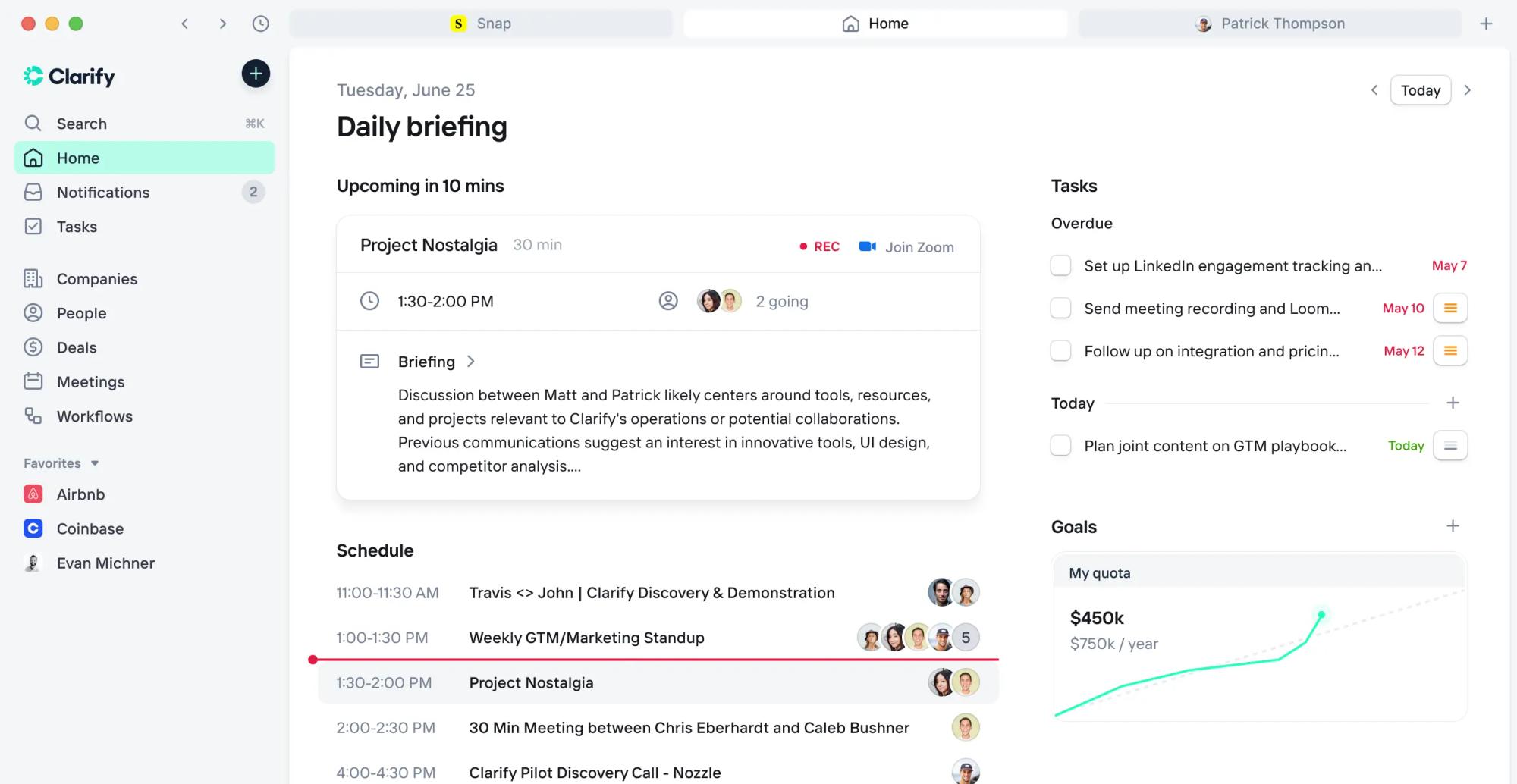
Clarify delivers modern, event-driven CRM built for autonomous data capture and intelligent workflows. The platform eliminates manual admin through AI-powered automation while maintaining founder-friendly, transparent pricing.
Best for: Founders wanting seat-agnostic pricing with AI that actively manages data quality and drives growth.
Standout features:
- Autonomous capture of emails, calls, and meeting notes without manual logging
- AI enrichment for contact data and intelligent draft assistance for outreach
- Event-driven workflows that trigger based on customer behavior patterns
- Transparent usage-based pricing that scales with activity, not headcount
- Flexible data model supporting custom fields and dynamic pipeline stages
- Deep integrations with analytics, enrichment, and communication tools
- Fast, collaborative interface designed for joyful daily use
Pricing snapshot: Usage-based credits starting free, with transparent billing based on value delivered rather than seats.
Trade-off: Newer ecosystem compared to legacy CRM marketplaces with fewer third-party apps.
Start for free to experience autonomous CRM capabilities with your existing workflow.
HubSpot for a robust free CRM and growth path
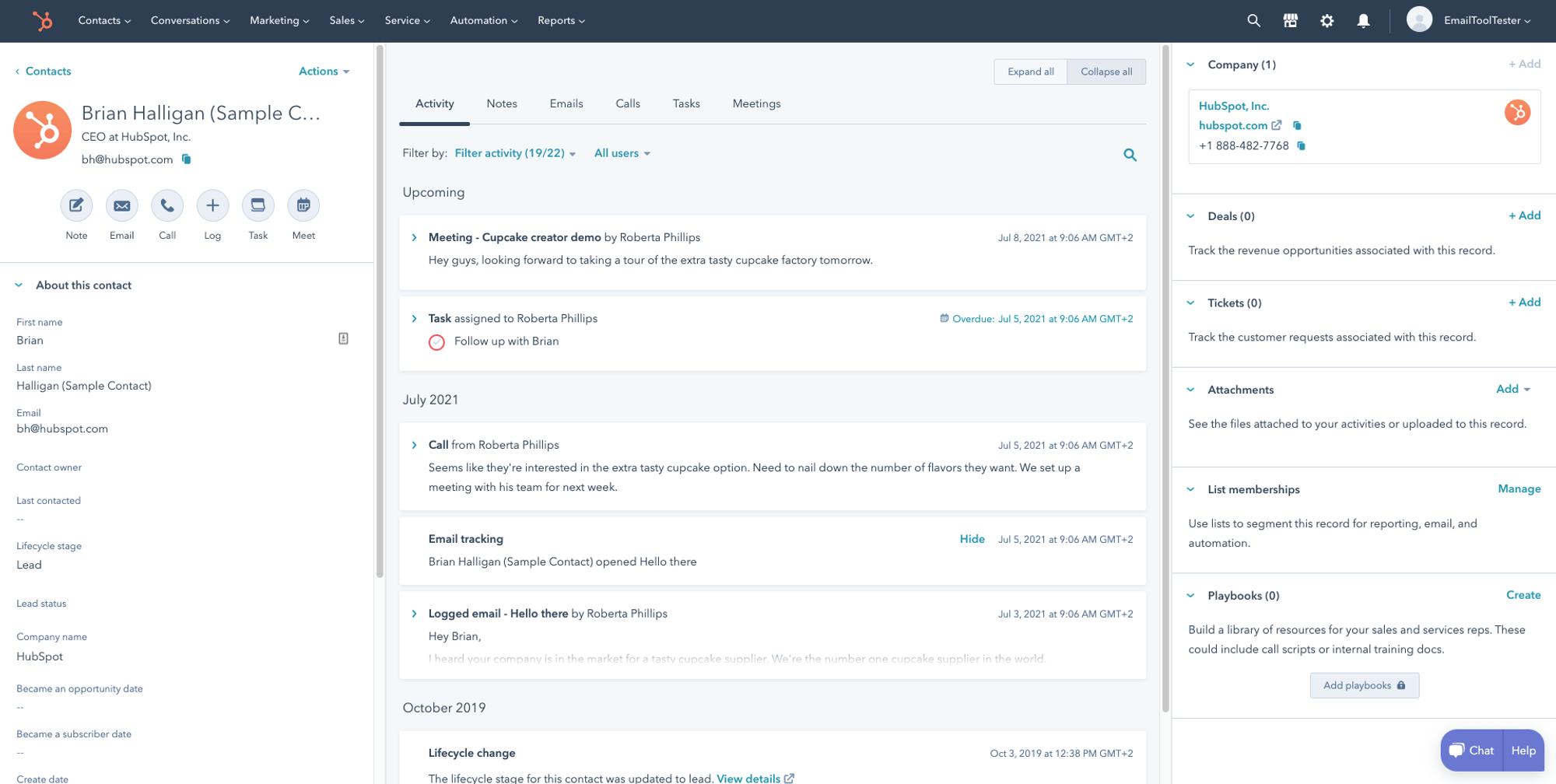
HubSpot provides a comprehensive free CRM tier with clear upgrade paths for marketing automation and advanced sales features. The platform serves as a single vendor solution from startup to scale.
Best for: Teams wanting one integrated platform from free tier through enterprise growth.
Standout features:
- Contact and deal tracking with unlimited users on free tier
- Email templates, sequences, and basic automation included
- Extensive app marketplace with 1,000+ integrations
- Marketing hub integration for lead generation and nurturing
- Comprehensive reporting and dashboard capabilities
Pricing snapshot: Free tier with core CRM, paid Sales Hub starts at $20 per seat monthly.
Trade-off: Add-on costs accumulate quickly as teams scale, potentially raising TCO above alternatives.
Industry analysis consistently ranks HubSpot's free tier among the most feature-complete for early-stage teams.
Zoho CRM for budget-friendly customization and AI
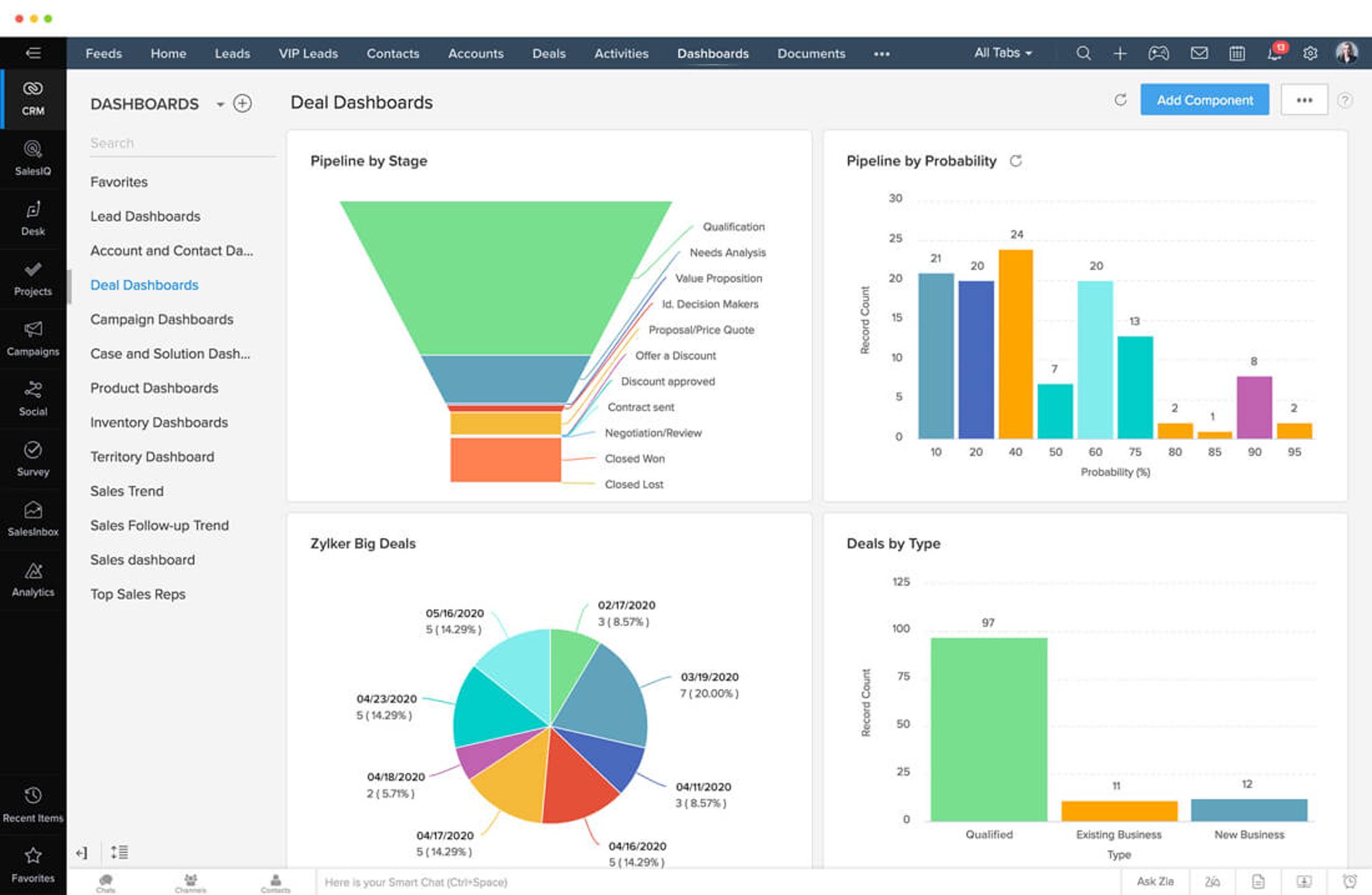
Zoho CRM combines affordable entry pricing with customization options and Zia AI assistant. The platform offers configurable workflows and modules without enterprise complexity.
Best for: Founders needing configurable CRM modules at startup-friendly prices.
Standout features:
- Custom fields, layouts, and module configuration
- Zia AI assistant for forecasting, lead scoring, and insights
- Advanced reporting and analytics for SMB teams
- Workflow automation with conditional logic
- Multi-currency and territory management
Pricing snapshot: Standard plan at $14 per user monthly, Professional at $23 with advanced features.
Trade-off: Interface learning curve for non-technical users despite customization power.
Comparison research highlights Zoho's affordability and feature depth as key differentiators in the SMB market.
Pipedrive for simple pipeline management and fast setup
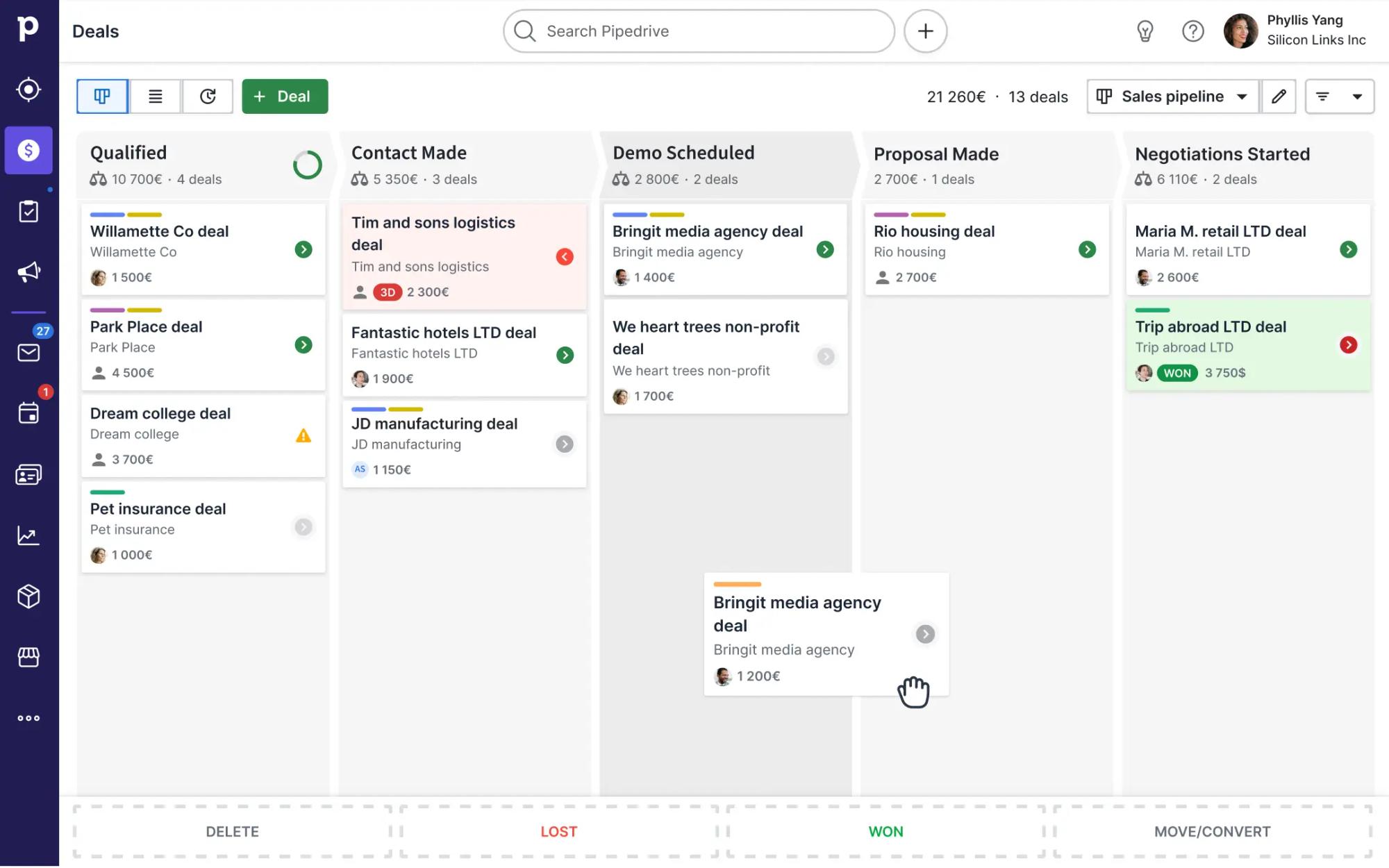
Pipedrive focuses on intuitive pipeline visualization with drag-and-drop deal management. The platform prioritizes sales process clarity over feature breadth.
Best for: Sales-led teams that live in pipeline views and need immediate productivity.
Standout features:
- Visual pipeline with drag-and-drop stage management
- Deal rotting alerts and accurate forecasting
- Native calling integration with automatic call logging
- Email sync and template library
- Goal setting and performance tracking
Pricing snapshot: Essential plan at $14.90 per user monthly, Advanced at $24.90 with automation.
Trade-off: Advanced reporting and marketing automation require higher-tier plans or third-party tools.
User research consistently praises Pipedrive's setup speed and pipeline usability for sales-focused teams.
Freshsales for user-friendly CRM with built-in calling
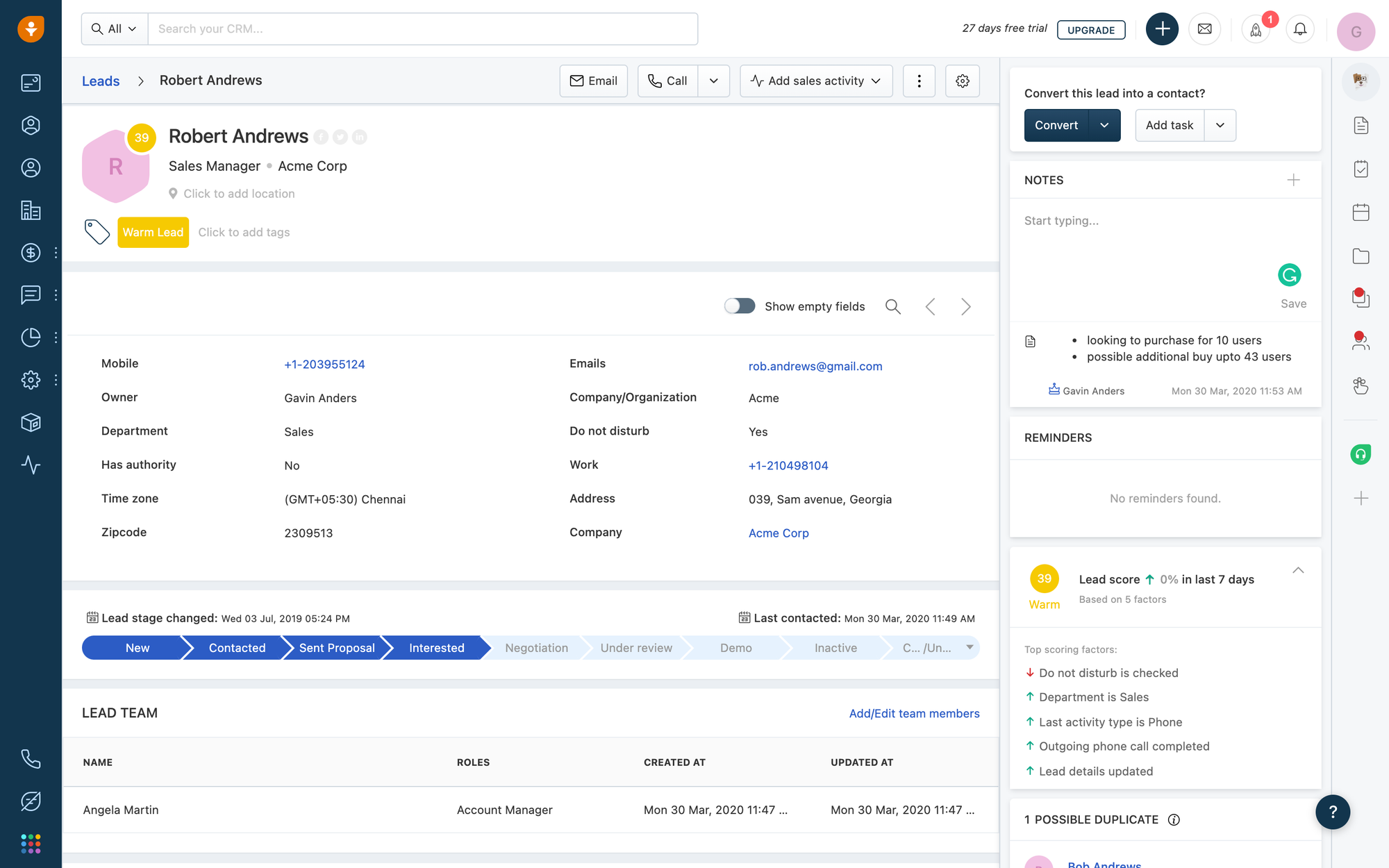
Freshsales combines streamlined CRM functionality with integrated telephony and Freddy AI insights. The platform serves service-oriented startups using calls and chat daily.
Best for: Service-led startups requiring integrated calling and multi-channel communication.
Standout features:
- Built-in calling with automatic call logs and recordings
- Freddy AI for lead scoring and predictive insights
- Chat widget and email integration in unified inbox
- Territory and team management tools
- Mobile app with offline access capabilities
Pricing snapshot: Growth plan at $15 per user monthly, Pro at $39 with advanced AI features.
Trade-off: Some advanced customizations and reporting require higher-tier plans.
Platform comparisons highlight Freshsales' telephony integration as superior for service-oriented businesses.
Less Annoying CRM for straightforward contact and task management
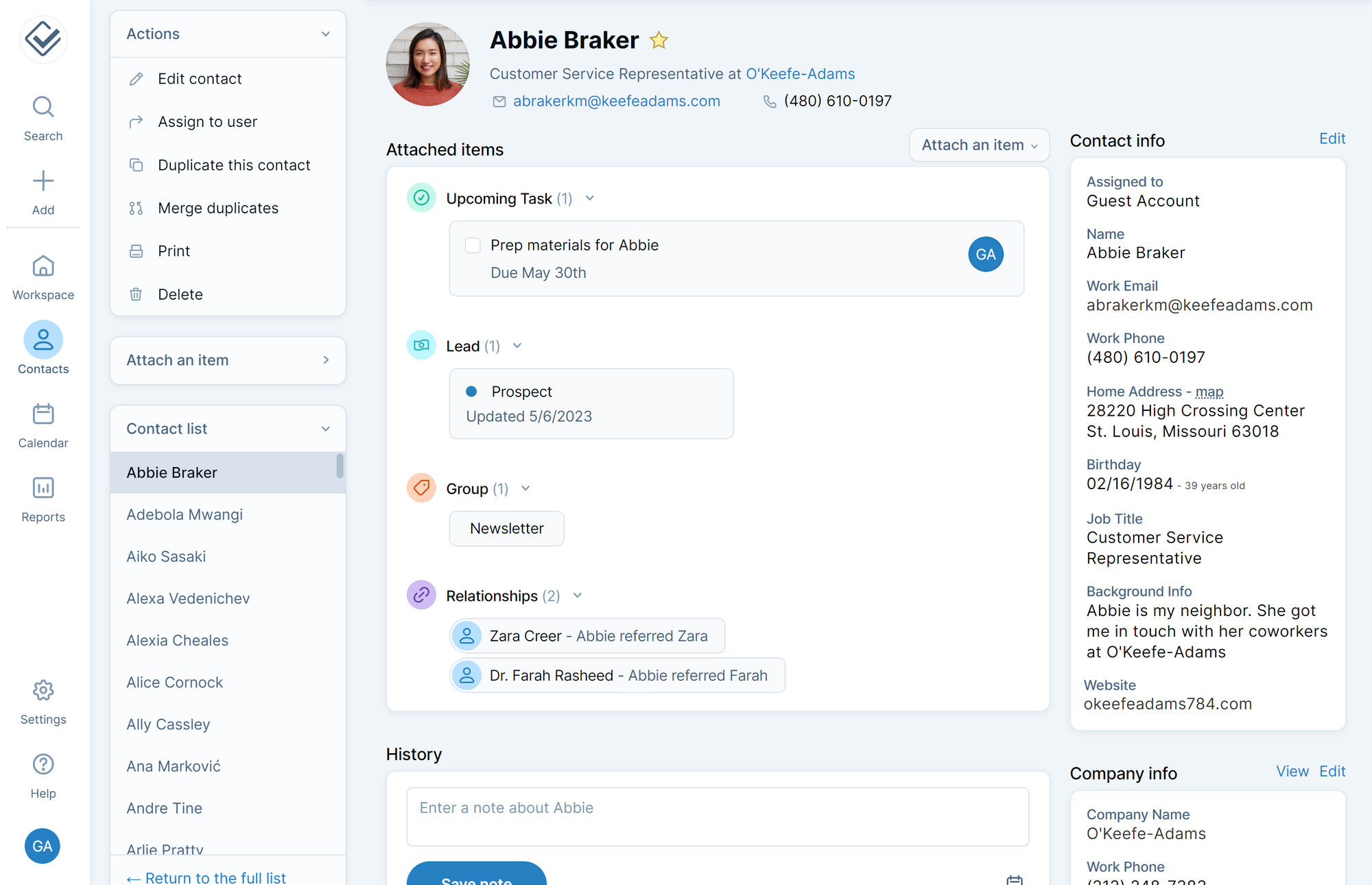
Less Annoying CRM delivers minimalist contact management focused on simplicity over feature complexity. The platform serves solo founders and micro-teams prioritizing ease of use.
Best for: Solo founders and micro-teams wanting simple contact tracking without learning curves.
Standout features:
- Clean contact records with custom fields
- Calendar integration and task reminder system
- Pipeline tracking with basic reporting
- No user limits or hidden fees
- Phone support included at all levels
Pricing snapshot: Flat $15 per user monthly with all features included.
Trade-off: Limited automation, integrations, and advanced reporting compared to full-featured CRMs.
Simplicity-focused research positions Less Annoying CRM as ideal for teams prioritizing usability over feature breadth.
Odoo CRM for open-source flexibility and low TCO
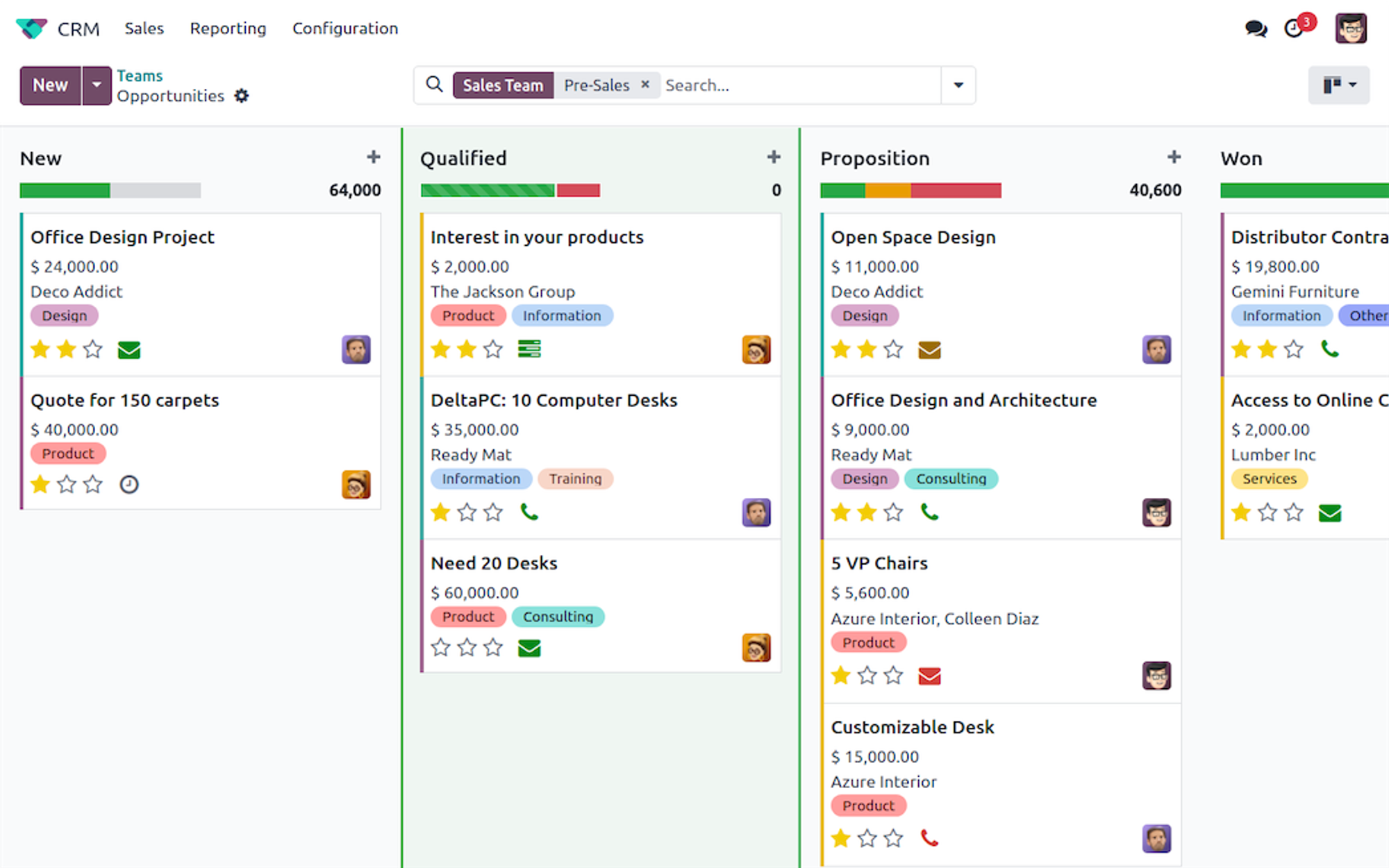
Odoo provides open-source CRM as part of a comprehensive business suite with modular applications. The platform offers maximum customization runway for technical founders.
Best for: Technical founders wanting customization control with integrated business applications.
Standout features:
- Customizable pipeline stages and data fields
- Integrated suite including invoicing, inventory, and helpdesk
- On-premise or cloud deployment options
- Open-source community and extensive app marketplace
- Multi-company and multi-currency support
Pricing snapshot: Community edition free, Online plans start at $24.90 per user monthly.
Trade-off: Setup complexity and maintenance overhead without dedicated admin support.
Open-source analysis emphasizes Odoo's flexibility and total cost advantages for technical teams.
Pricing, limits and total cost to expect
Sticker prices understate real CRM costs due to add-ons, integrations, and scaling limitations. Understanding total cost prevents budget surprises as teams grow.
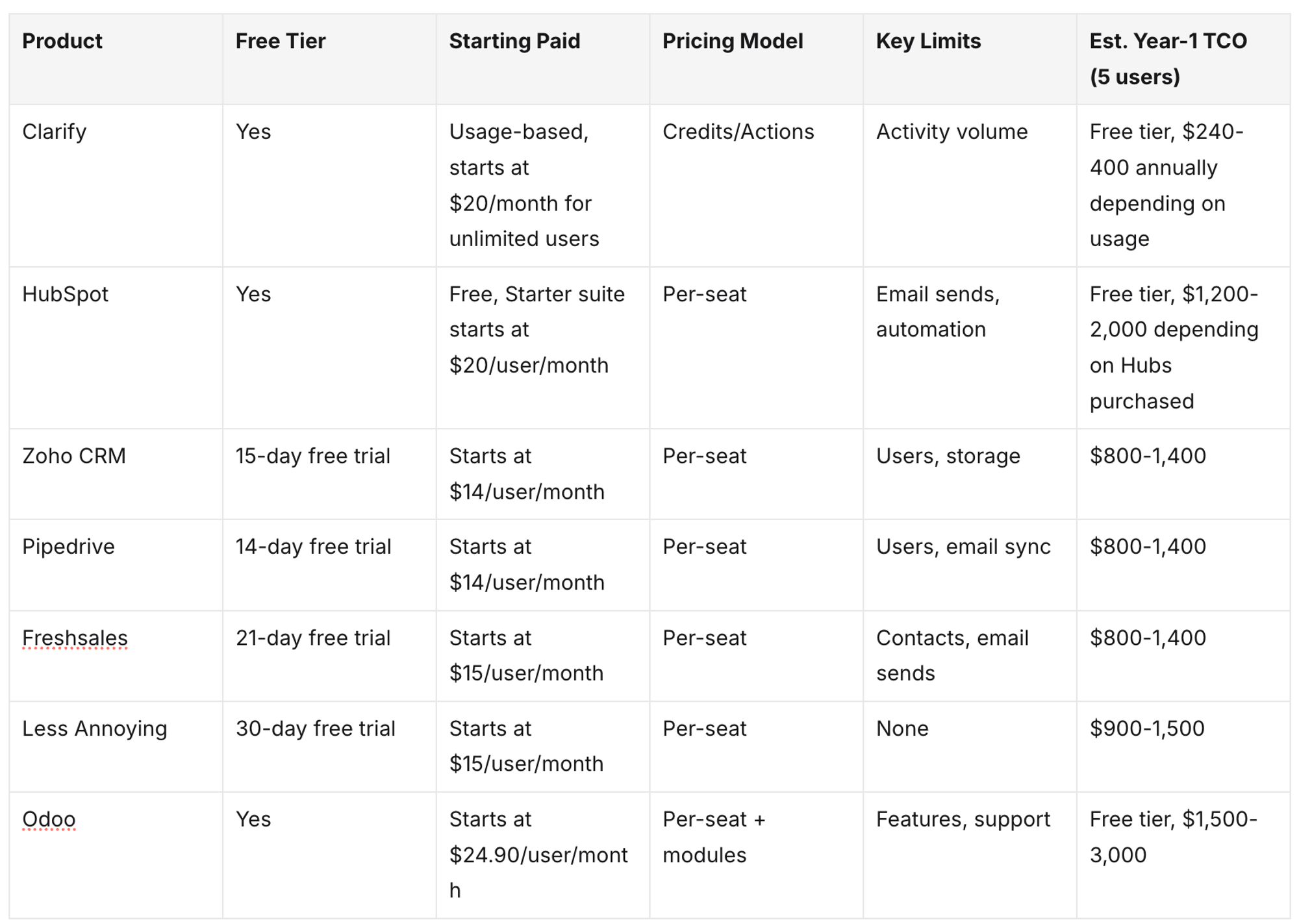
*TCO estimates include typical add-ons and assume moderate usage growth. Pricing research shows actual costs often exceed initial budgets by 40-60%.
Hidden limits in free tiers founders hit first
User caps typically range from 2-5 seats before requiring paid upgrades. Contact limits vary from 1,000 to unlimited, with email sends capped at 200-2,000 monthly.
Automation restrictions limit workflows to 1-5 active processes. Reporting access reduces to basic metrics without custom dashboards. API call limits restrict integration capabilities to 1,000-10,000 requests monthly.
Support tiers often exclude phone assistance and limit response times to 48-72 hours. Data portability varies significantly, with some platforms restricting CSV exports or API access.
Confirm export rights and upgrade triggers in writing before committing to any platform long-term.
Per-seat versus seat-agnostic and usage-based pricing
Per-seat models charge monthly fees per user account, providing predictable costs but penalizing cross-functional collaboration. Teams pay for inactive accounts and limit access to preserve budgets.
Seat-agnostic pricing allows unlimited user invitations while charging for usage, credits, or data volume. This model encourages collaboration across sales, product, support, and marketing teams.
Usage-based pricing charges for specific actions like emails sent, data enrichments, or API calls. Teams pay only for active usage while avoiding idle-seat waste.
Recommend seat-agnostic models for founder-led teams spanning multiple functions. Cost analysis shows usage-based pricing reduces waste by 30-50% for cross-functional startups.
Example: 3-person startup growing to 8 people pays $180 monthly per-seat versus $120 usage-based for same activity level.
How to estimate total cost beyond sticker price
TCO Formula: Licenses + Add-ons + Integrations + Data Enrichment + Implementation Time + Support
Example calculation:
- 5 users × $20 monthly = $1,200 annually
- Add-ons (automation, reporting) = $600 annually
- Data enrichment service = $300 annually
- Implementation (10 hours × $75) = $750 one-time
- Premium support = $0-300 annually
- Total estimated TCO: $2,850-3,150 first year
Model scenarios at 2× current users plus one additional add-on to anticipate growth costs. SMB research shows hidden costs drive 60% of CRM upgrades within 12 months.
Setup, migration and adoption tips for small teams
Launch fast with minimal fields, automate data capture from day one, and iterate based on actual usage patterns. Avoid over-engineering initial setup—speed and clean data matter more than perfect configuration.
Focus on "phase 1" scope with 30-day improvement cycles rather than comprehensive rollouts that delay value.
Launch your CRM in 48 hours with a lean checklist
Hours 0-24:
- Define one primary pipeline with 5-7 clear stages
- Create essential fields: owner, stage, amount, close date, next step
- Connect email and calendar for automatic activity logging
- Import first 100-300 leads for testing and validation
Hours 24-48:
- Enable auto-capture for emails, calls, and meeting notes
- Build 2-3 core automations (stage change → task creation)
- Create 3 saved views for daily pipeline management
- Configure mobile app logins for team members
- Test data flow and fix any sync issues
Setup research confirms that quick wins within 48 hours drive 80% higher adoption rates than extended implementations.
Migrate cleanly from spreadsheets or a legacy CRM
Audit phase: Deduplicate contacts, normalize field formats, and archive inactive records older than 18 months.
Mapping phase: Align spreadsheet columns to CRM fields, define picklist values, and standardize naming conventions.
Pilot phase: Import 50-100 sample records, validate field mapping, and test automation triggers.
Automation phase: Enable data enrichment, email sync, and calendar integration before full import.
Cutover phase: Freeze legacy system edits, export complete backups, communicate go-live date, and provide team training.
Prioritize platforms with robust export capabilities and API access for future migrations. Migration best practices emphasize data validation over speed.
Drive adoption and data quality with minimal overhead
Minimize required fields to essential information only. Enable automatic activity logging to reduce manual data entry burden.
Set clear SLAs for response times and follow-up actions. Use shared pipeline views, @mentions, and comments for transparent collaboration.
Track simple daily metrics: new leads added, next steps scheduled, and meetings completed. Conduct 15-minute weekly pipeline reviews focusing on deal progression.
Iterate field additions sparingly based on actual usage patterns rather than anticipated needs. Adoption research shows usability drives 90% of SMB CRM success rates. The right CRM balances essential functionality with founder-friendly pricing and setup speed. Clarify leads for autonomous, seat-agnostic AI automation that eliminates busywork and drives growth, while HubSpot provides the strongest free tier for traditional approaches.
Consider your team structure when choosing pricing models. Cross-functional startups benefit from seat-agnostic options like Clarify's usage-based credits, while sales-focused teams may prefer per-seat predictability.
Prioritize platforms with transparent pricing, robust data export capabilities, and automation that reduces manual overhead. Test setup speed and mobile usability before committing to annual contracts.
Start with core functionality and iterate based on actual usage patterns. The best CRM is the one your team actually uses consistently, not the one with the most features.
Focus on speed to value over perfect configuration. Launch in 48 hours, automate data capture, and refine processes based on real workflow needs.
Frequently Asked Questions
Can I avoid per-seat pricing with a low-cost CRM?
Yes, seat-agnostic and usage-based pricing models eliminate per-user fees. Clarify charges based on activity credits rather than user count, allowing unlimited team members across sales, marketing, and support. Alternative providers offer free tiers with user limits or usage-based billing. These models reduce costs for cross-functional startup teams where multiple departments need CRM access without inflating monthly expenses.
How do I connect product analytics and billing without engineering?
Choose CRMs with native integrations for your analytics and billing platforms, or no-code connectors through automation tools. Clarify offers extensive integration capabilities with webhook triggers and API connections requiring minimal technical setup. Map product events to CRM deals and customer records using pre-built connectors that sync data automatically between systems.
What happens when we outgrow a free tier—do we lose data or automations?
You retain all existing data and automations when upgrading, but hit usage caps requiring paid plans to continue operations. Confirm export capabilities and upgrade thresholds during initial setup. Most platforms provide clear migration paths between tiers, though some advanced features may require reconfiguration on higher-tier plans.
How portable is our data if we need to switch CRMs later?
Data portability depends on export capabilities and API access. Ensure your CRM supports CSV export, open APIs, and webhook functionality for complete data migration including contacts, deals, and activity history. Clarify provides comprehensive data export tools with full API access. Test export functionality during trial periods to verify you can migrate cleanly to alternative solutions if needed.
Do low-cost CRMs support EU data residency and GDPR?
Many budget-friendly CRMs offer GDPR compliance tools and EU data residency options. Look for platforms providing data processing agreements, regional hosting, consent management, data subject rights tools, and audit logging capabilities.
Get our newsletter
Subscribe for weekly essays on GTM, RevTech, and Clarify’s latest updates.
Thanks for subscribing! We'll send only our best stuff. Your information will not be shared and you can unsubscribe at any time.